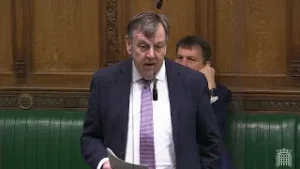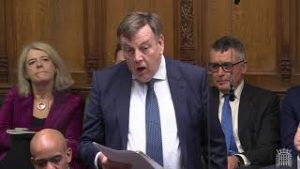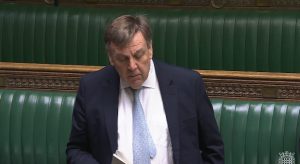Keir Starmer Leader of the Labour Party, The Prime Minister
Less than a week since I called on this House to show the courage of our predecessors, we see clearly before us the test of our times, a crossroads in our history. With permission, Mr Speaker, I will update the House on my efforts to secure a strong, just and lasting peace following Russia’s vile invasion of Ukraine.
It begins in this House, where on Tuesday I announced the biggest sustained increase in defence spending since the cold war—a recognition of the fact that, once again, we live in an era where peace in Europe depends upon strength and deterrence, but also a rediscovery of the old post-war argument, long held on these Benches, that economic security is national security. Because the demands we now have to make of Britain must come alongside a new foundation of security for working people.
The tough choices that we made last week are not done. We must use the process of getting to 3% of our national income spent on defence to fundamentally rebuild British industry, and use our investment in military spending to create new jobs and apprenticeships in every part of the country. That is why last night I announced a deal that perfectly symbolises the new era: a partnership with Ukraine that allows them to use £1.6 billion of UK Export Finance to buy 5,000 air defence missiles, manufactured in Belfast. That means UK jobs, UK skills and UK finance pulling together for our national interest, putting Ukraine in the strongest possible position for peace, and protecting innocent civilians from the terror of Russian drones.
My efforts continued on Thursday, when I met President Trump in the White House to strengthen our relationship with America. Now, what happened in his subsequent meeting with President Zelensky is something nobody in this House wants to see. But I do want to be crystal clear: we must strengthen our relationship with America. For our security, for our technology and for our trade and investment, they are and always will be indispensable. And we will never choose between either side of the Atlantic—in fact, if anything, the past week has shown that that idea is totally unserious. While some people may enjoy the simplicity of taking a side, this week has shown with total clarity that the US is vital in securing the peace we all want to see in Ukraine.
I welcome the opportunity for a new economic deal with the US, confirmed by the President last week, because it is an opportunity that I am determined to pursue. I welcome the positive discussions that we had on European security, including his clear support for article 5 of NATO. I welcome the understanding, from our dialogue, that our two nations will work together on security arrangements for a lasting peace in Ukraine. I also welcome the President’s continued commitment to that peace, which nobody in this House should doubt for a second is sincere.
I now turn to the events of this weekend and the moving scenes that greeted President Zelensky as he arrived in London on Saturday. I saw for myself that he was taken aback when the crowd in Whitehall cheered at the top of their voices. They were speaking for the whole of our country—a reminder that this Government, this House and this nation stand in unwavering support behind him and the people of Ukraine. We resolved together to move forward the strong cause of a just and lasting peace in Ukraine.
Then on Sunday I hosted European leaders from across our continent, equally committed to this cause, including President Macron, Prime Minister Meloni, the leaders of NATO, of the European Commission and of the European Council, and the Prime Minister of Canada—a vital ally of this country, the Commonwealth and Ukraine, responsible for training over 40,000 Ukrainian troops. I also had the privilege beforehand of speaking online to the leaders of Estonia, Lithuania and Latvia, each of whom, close as they are to the frontline with Russia, stressed the urgency of the moment.
It was a productive summit. Together, we agreed a clear strategy: that the United Kingdom, France and our allies will work closely with Ukraine on a plan to stop the fighting, which we will then discuss directly with the United States. It is a plan with four clear principles, which I will now share in full with the House. First, we must keep the military aid to Ukraine flowing and keep increasing the economic pressure on Russia. To that end, alongside our partnership on air defence, we are doubling down on military aid. Already this year, we have taken our support to record levels. On Saturday, we also agreed a new £2.2 billion loan for Ukraine, backed not by the British taxpayer but by the profits from frozen Russian assets. Second, we agreed that any lasting peace must guarantee the sovereignty and security of Ukraine, and that Ukraine must be at the table when negotiating their future—that is absolutely vital. Third, we agreed that in the event of a peace deal we will continue to boost Ukraine’s defences and Ukraine’s deterrence. Finally, fourth: we agreed to develop a coalition of the willing, ready to defend a deal in Ukraine and guarantee the peace.
After all, the Ukrainian position is completely understandable. For them, the war did not begin three years ago; that was merely the latest and most brutal escalation. They have signed agreements with Putin before. They have experienced the nature of his diplomacy and the calibre of his word. We cannot accept a weak deal like Minsk again. No, we must proceed with strength, and that does now require urgently a coalition of the willing. We agreed on Sunday that those willing to play a role in this will intensify planning now, and, as this House would expect, Britain will play a leading role—with, if necessary, and together with others, boots on the ground and planes in the air. It is right that Europe does the heavy lifting to support peace on our continent, but to succeed this effort must also have strong US backing.
I want to assure the House that I take none of this lightly. I have visited British troops in Estonia, and no aspect of my role weighs more heavily than the deployment of British troops in the service of defence and security in Europe. Yet I do feel very strongly that the future of Ukraine is vital for our national security. Russia is a menace in our waters and skies. They have launched cyber-attacks on our NHS and made assassination attempts in our streets. In this House, we stand by Ukraine because it is the right thing to do, but we also stand by them because it is in our interests to do so. If we do not achieve a lasting peace, the instability and insecurity that has hit the living standards of working people in Britain will only get worse and Putin’s appetite for conflict and chaos will only grow.
A strong peace, a just peace and a lasting peace: that has now to be our goal. It is vital, it is in our interests and in its pursuit Britain will lead from the front. For the security of our continent, the security of our country and the security of the British people, we must now win the peace. I commend this statement to the House.
John Whittingdale Conservative, Maldon
Does the Prime Minister share my concern and sadness that any settlement appears to involve acceptance of the Russian occupation of parts of the sovereign territory of Ukraine? Will he recognise that the Baltic nations will now feel even more exposed? While I welcome his telephone conversations with their leaders at the weekend, can he give an assurance that they will be at the table for any future discussions of European security?
Keir Starmer Leader of the Labour Party, The Prime Minister
On the question of territory, obviously there are discussions to come, but I take the tenor of what the right hon. Member said. On the Baltic states, he is right. Just before Christmas, I was at the joint expeditionary force meeting in Estonia to have discussions with them. I have been twice to the frontline in Estonia, where we have British troops. They feel immediately the threat, for very obvious reasons. I spoke to the Baltic states yesterday morning at some length, and assured them that we need to look again at the configuration when we have meetings of European and other allies to ensure that those states are properly represented, because, for them, the threat is very clear and very near.
Please see the link below to watch a clip of Sir John’s question:


